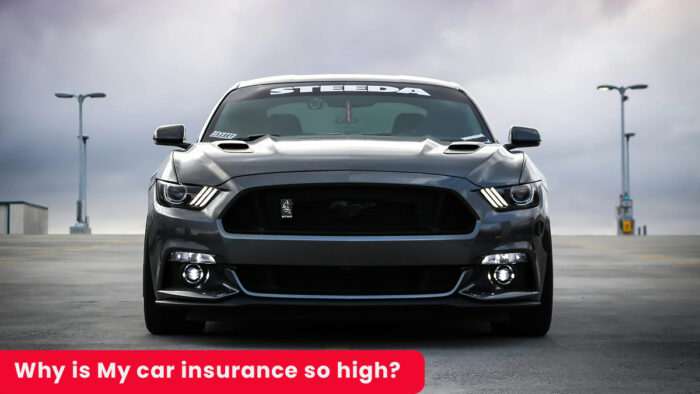Generally, the cost of insuring a car can be prohibitive. However, car insurance premiums have been increasing lately. You may be asking, “Why is my car insurance so high?” Read on to see possible reasons why your premium rate is on the high side.

There are several factors that affect the rates of auto insurance premiums, some of which include driving record, location, and marital status. If your premiums seem very high, below are some of the possible causes.
Why Your Car Insurance is So High
If your car insurance premium has gone up, or it just feels too high, you’re probably wondering what’s driving the cost. The truth is, insurance companies consider many factors when setting your rate, and some of them may be working against you.
Here are some of the most likely reasons your car insurance might be expensive right now, along with practical tips on how to bring that cost down.
Personal and Social Factors Affect Your Car Insurance Rates
When it comes to car insurance, it’s not just your driving history that matters, your personal and social details also play a big role in how much you pay. Let’s break down some of the key factors that could impact your premium.
- Age: Your age has a major influence on your car insurance cost. Young drivers, especially teens, typically pay the highest rates because they’re seen as inexperienced and more likely to take risks on the road.As you get older and gain more experience, your rates usually go down. However, premiums can start to rise again once you reach your mid-60s, as insurers may view older drivers as higher risk.
- Gender: can also affect your rate, especially for younger drivers. Teenage males often face higher premiums because statistics show they’re more likely to engage in risky driving behavior. That said, several states, including California, Hawaii, Massachusetts, Michigan, North Carolina, and Pennsylvania, have banned insurers from using gender as a pricing factor.
- Education and Occupation: Your level of education and the type of job you have can also influence your insurance costs. Some insurers believe there’s a connection between these factors and the likelihood of filing a claim. For example, drivers with college degrees or professional job titles may receive lower quotes. While this practice has drawn criticism, it’s still used by many companies today.
- Marital Status: Being married can actually save you money on car insurance. Married couples are often seen as more financially stable and less likely to take driving risks. If you recently got married, it’s a good idea to compare quotes again, you might find better rates when applying as a couple.
- Where You Live: Your location has a big impact on your premium. Living in a densely populated city usually means higher rates because there’s a greater chance of accidents, theft, and vandalism. States with stricter coverage requirements or frequent severe weather may also drive up your costs.
- Homeownership: If you own your home, you might enjoy lower car insurance rates. Many insurers offer discounts for homeowners, especially if you bundle your home and auto insurance policies with the same company.
- Credit History: In most states, your credit score is another factor insurers use to determine your rate. Drivers with good credit are often seen as less risky, so they usually get lower premiums. On the other hand, poor credit can lead to higher costs. However, states like California, Hawaii, Massachusetts, and Michigan have banned the use of credit scores when calculating car insurance.
Driving Skills and Habits
Your driving skills, and those of anyone listed on your car insurance policy, play a major role in how much you pay for coverage. Insurance companies use your driving experience, history, and even how often you drive to assess your level of risk. Let’s take a closer look at the key factors.
- Adding More Drivers or Vehicles: Every driver and vehicle you add to your insurance policy can raise your premium. This is especially true when adding a teen driver, as they’re seen as high-risk due to their limited experience. Similarly, insuring more than one vehicle usually costs more than covering just one. If you need to include additional drivers or cars, it’s wise to compare quotes from multiple insurers to find the best rate.
- Driving Experience Matters: Drivers with less experience, especially those under the age of 25, tend to pay higher premiums. Insurers consider them more likely to be involved in accidents. As you gain more time behind the wheel without any incidents, your rates often go down. If you’re a new driver or shopping for insurance for your teen, be sure to compare quotes to find more affordable options.
- Your Driving Record: A clean driving history helps you save money. Tickets, accidents, and other violations can significantly increase your premium. For example, getting a speeding ticket can raise your rate. If you have a clean driving history, you’re likely to pay much less for car insurance than someone with violations. Accidents, speeding tickets, and serious offenses like DUIs tell insurers that you may be more likely to file a claim. As a result, your rates can go up significantly.
- Choice of Vehicle and Safety Factors Affect Car Insurance Rates: What you drive and how you protect it can make a big difference in what you pay for car insurance. Insurance companies look closely at your vehicle’s value, features, and where it’s kept when calculating your premium. Here’s a breakdown of how your car and its surroundings can impact your insurance costs.
- Car Make, Model, and Trim: The type of car you own plays a major role in determining your insurance rate. Generally, vehicles that are cheaper to repair or replace, like compact sedans or base-level models, tend to cost less to insure. On the other hand, luxury vehicles, sports cars, and models with premium trim packages often come with higher repair costs, which pushes insurance premiums up. Even the smallest upgrades, like a higher-end infotainment system or specialty wheels, can increase the cost of coverage.
- Financed or Leased Vehicles: If your car is leased or financed, your lender will likely require full coverage insurance. This includes collision and comprehensive coverage to protect the vehicle until it’s paid off or returned. Full coverage offers strong protection, especially for new or high-value vehicles, but it also raises your monthly premium compared to a basic liability-only policy. In addition, leased vehicles often require higher liability limits, which means your insurance will cost more than it would if you owned the car outright.
- Where You Park: Garage vs. Street: Believe it or not, where you park your car overnight can influence your rate. Insurers typically offer lower premiums if your car is parked in a secure garage rather than on the street, where it’s more exposed to theft, vandalism, or weather-related damage. Some companies even offer a “garage discount” on your collision and comprehensive coverage.
- Location-Based Risks: Your zip code matters too. If you live in an area with a high number of thefts, vandalism, severe weather, or frequent accident claims, you can expect your insurance rates to reflect that added risk. Insurance companies use both internal data and local statistics to determine how likely it is that drivers in your area will file a claim by around 25%. If you’re involved in an accident that causes injuries, your rates might increase by 50% or more. To keep your costs low, drive safely and follow traffic laws consistently.
- How Much You Drive: The number of miles you drive each year also affects your premium. The more time you spend on the road, the higher your risk of getting into an accident, so insurers usually charge more. If you drive less frequently, look for low-mileage insurance plans. Some insurers offer special discounts or policies specifically for people who don’t drive much.
Choice of Insurance Company and Coverage History
When it comes to car insurance, who you choose and your past coverage habits matter more than you might think. Insurers look at your claims history, previous policies, and even how long you’ve stayed with the same company when determining your rate. Here’s how these factors can impact what you pay and what you can do about it.
- Lost or Dropped Discounts: Has your premium gone up unexpectedly? It could be due to the loss of a discount you once qualified for. For example, a speeding ticket might disqualify you from a safe driver discount. Or your vehicle may have aged out of a “new car” discount. If that’s the case, contact your insurer and ask about any new discounts you might now be eligible for to bring your rates back down.
- Picking the Right Auto Insurance Company: Not all insurance companies calculate rates the same way. Each has its own formula, meaning some might offer you a better deal based on your specific driver profile. That’s why it’s smart to shop around and compare quotes. The right match can save you hundreds of dollars a year and still give you the coverage you need.
- Your Claims History: Insurance companies look closely at how often you’ve filed claims. If you’ve made several claims, they may label you as a high-risk driver and raise your rates. Before filing a small claim, consider whether the payout is worth the long-term cost. If the amount is just a bit more than your deductible, it might be better to pay out of pocket and protect your clean record.
- Gaps in Insurance Coverage: Letting your car insurance lapse, even for a short time, can raise red flags for insurers. It might happen if you forget to pay your premium, cancel your policy without replacing it, or have your license suspended. Our research shows that after a lapse, drivers pay an average of 16% more for car insurance. To avoid this, always make sure there’s no break between policies.
Is It Normal for Car Insurance Rates to Increase Without Explanation?
No, not really. If your premium goes up and there’s no clear reason, your insurer should be able to explain. Factors like inflation, rising repair costs, or regional risk changes might be behind the hike, but you have the right to ask questions and even contact your state’s insurance regulator if something seems off.
How to Save Money on Car Insurance
Looking to cut down your car insurance costs without sacrificing coverage? You’re not alone. Fortunately, there are smart and simple ways to find cheaper auto insurance. Here are six effective strategies that can help you get the best deal:
1. Compare Quotes Regularly
Prices vary significantly between insurance companies, so don’t settle for the first quote you get. Shopping around once a year can help you catch better deals as rates shift over time. Use online comparison tools to easily view offers side-by-side and find the most affordable option that still meets your coverage needs.
2. Take Advantage of Discounts
Many drivers miss out on discounts they already qualify for. If you work from home and drive less, ask about a low-mileage discount. Other common discounts include bundling your auto insurance with a homeowner or renters’ policy, insuring multiple vehicles under one policy, and good student discounts for teens and college drivers. Always ask your insurer what’s available, you might be surprised at what you qualify for.
3. Let Life Event Work in Your Favor
Big life changes can sometimes mean lower insurance rates. Getting married, moving to a safer neighborhood, or changing jobs (especially if you now work remotely) could all affect your premium. When something changes in your life, it’s a great time to request new quotes and potentially lock in a better rate.
4. Increase Your Deductible
Raising your deductible, the amount you pay out of pocket before your insurance kicks in, can lower your monthly premium. Just make sure the new amount is something you can comfortably afford in the event of an accident.
5. Recheck Rates After Your Driving Record Improves
Tickets and accidents don’t stay on your record forever. If it’s been three to five years since a violation, your driving history may have improved enough to qualify for lower rates. Shop around again to see if better pricing is now available to you.
6. Rethink the Car You Drive
Believe it or not, your car’s make and model can significantly affect your insurance rate. Newer or luxury vehicles often cost more to insure due to higher repair and replacement costs. If you’re in the market for a new car or even just curious, it’s worth checking which vehicles are cheapest to insure before making a decision.



